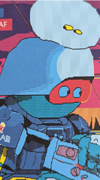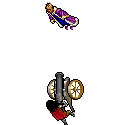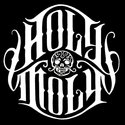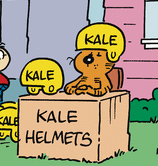|
Atlas Hugged posted:I'm reading Long Sun right now and I've noticed two things. First, it's the first book by Wolfe I've read that isn't first person. So that jumped out at me right away. Second, it's amazingly slow but really captivating. I'm struck by how far removed from New Sun it is. It really shows the range of talent he has as an author. It's a really, really, really stellar work and I haven't given it the time it deserves. And then the bonus is, you get Short Sun as a follow-up which is probably the best thing Wolfe's written, for me. You're in for some surprises with both the narration and the pacing, Wolfe does neat stuff with both, per the course. Re: Severian & Cugel, I read The Dying Earth omnibus pretty recently myself and that's a great comparison - it dawned on me after a while that Cugel is not the hero, he's not even an anti-hero, he's 100% villain. Which also could apply to Severian, from the perspective of most of Urth's residents.
|
|
|
|

|
| # ? May 12, 2024 23:37 |
|
Juaguocio posted:I especially loved, er, ah, Remora's, um, dithering, Incus's insistence on emphasizing the important points, and Oreb's fantastic interjections. After reading the Long Sun I've come to the conclusion George RR Martin does a homage to Oreb in Song of Ice and Fire. Though I also started to become terrified of the idea that SOIF is also set on a Generational ship, like the Whorl...
|
|
|
|
Nebakenezzer posted:After reading the Long Sun I've come to the conclusion George RR Martin does a homage to Oreb in Song of Ice and Fire. Though I also started to become terrified of the idea that SOIF is also set on a Generational ship, like the Whorl... Please elaborate.
|
|
|
|
Chichevache posted:Please elaborate. This is going to be some proper spergin' here, so I apologize in advance. This is not going to be any sort of good argument, just a vague suspicion. I should add I've read SOIF up to its current volume, but stopped watching the TV series around...season 3? Well, I know Martin is a fan of Wolfe - when I re-read The book of the Old Sun the last volume actually had an extensive cover blurb praising it from Martin. Since I've been reading what books of Gene Wolfe my dad has, I've noticed one or two little homages in SOIF that Martian has - Oreb as I mentioned, though I noticed the underhanded incestuous twins in Shadow of the Torturer - while not exactly like Cercei and Jamie Lannister, I wondered if they might have inspired the Lannister Twins. In the last book, A Dance of Dragons, Martin reveals a few things, though because we only hear about these things though people who have a medieval world view, it's a little hard what to make of them. In particular, we hear about some infrastructure from old Valeria, a high road that is "demon haunted." We also learn that Danerys is not just immune to fire - she's immune to disease as well. It got me thinking a bit about the Valerians, and wondering if Martin was doing something clever, by hiding things behind fantasy tropes. (It's kind of a moot point really - technology sufficiently advanced is indistinguishable from magic, so maybe the old Valyerians had just - lots of it.) I fell down the rabbit hole when I read "The World of Ice and Fire." [Yes, I enjoyed the hell out of a lavishly produced book about this made up world. DON'T JUDGE ME] Ahem. Anyway, it uses a narrative frame: the book is fictionally written (a confusing concept for most, straight forward for Wolfe readers) by a maester of the Citadel. This Maester is smart, scholarly, and above all, rational. This perspective is occasionally used to great comedic effect when the Maester comments on events that the readers of SOIF have actually been witness to. The Maester always comes down on the rational explanation - and we as the readers know 'no, it's actually the fantastical version you dismissed.' As the book goes on, a couple surprising things jumped out at me. First, a group of men everyone described as 'hairy' (the Whalers of Ibben for readers) - are actually neanderthals - the maester gives a more through description and it's all there: heavy brow, strong jaw, on average a lot stronger than 'other peoples'. This is reinforced when the Maester, being through, tells us something like 'these northern men can actually intermarry with southerners - their union produces stillborn children.' When talking about the same sort of people in the south, the Maester mentions that you *can* have viable offspring, so I guess evolutionary speaking, they are closer to the average human. This has a connection to our world - most of you probably know that Neanderthals didn't die out, pushed to extinction by homo sapiens. They actually were absorbed by us instead, so now all humans around the world have a little bit of Neanderthal in them, save people living in Sub-Saharan Africa. This set my imagination off and running, and I began looking at the book, wondering if there was anything else that a medieval scholar would see one way, but a modern might see another. The Children of the Forest sort of resemble those 'hobbit people' recently discovered, and the Giants do resemble certain ancestors and relations we humans had on the family tree. Aside from the probable existence of Mermaids (or crab people or something) the book mentions the existence of certain ancient structures that are usually subterranean that pre date humans living there. In addition to being seemingly pointless, they are also constructed by an unknown method - the author describes them as "seamless", which makes me think of concrete. These structures put me in mind of going subterranean in the Long Sun. While the Chronology is a little vauge, the Maester confirms something in his discussion of the world - that the "great darkness" that is a legend in the Seven Kingdoms also happened across the world, as far as the neo-China, putting a factual basis on something I'd just assumed was a legend. This put me in mind of the malfunctions of the Long Sun (though I guess it could be worse - Silk I think remembers when the sun went out - then turned on again on full blast, burning people and causing fires.) There's also Bran the Builder - who in the vauge Chronology of the Book has showing up at the time of the first men, and credits him for the construction of some of the Wall and some of the more fantastic castles of the realm. With my imagination running, I wonder if this Bran the Builder was one - or several - remnants of whatever race built these weird structures, or those colossal citadels on the eastern edge of the world. Once again, the line between magic and technology becomes fuzzy. There's also the TV opening. If you notice the Map for Game of Thrones is on the inside of a globe - like the whole thing was in a Dyson sphere. This way probably lies madness, so if you'll excuse me I'm going to scour the books for mentions of celestial phenomena. Have they a moon?! Does this moon rise and set? Wait - have they mentioned the SUN rises and sets? Oh! In the book they give complete genealogies of the Targaryen Kings and Queens. Maybe I can figure out who is more pure fire person based on their ability to successfully conceive with normal humans!
|
|
|
|
Nebakenezzer posted:This is going to be some proper spergin' here, so I apologize in advance. This is not going to be any sort of good argument, just a vague suspicion. I should add I've read SOIF up to its current volume, but stopped watching the TV series around...season 3?  nicely done my dude nicely done my dude
|
|
|
|
All of which is just a shade of the Shadow Earth that Amberites visit.
|
|
|
|
Nebakenezzer posted:This is going to be some proper spergin' here, so I apologize in advance. This is not going to be any sort of good argument, just a vague suspicion. I should add I've read SOIF up to its current volume, but stopped watching the TV series around...season 3? This makes sense if you've read Martin's other SF works like the Haviland Tuff books, which I enjoy quite a bit.
|
|
|
|
Huzanko posted:This makes sense if you've read Martin's other SF works like the Haviland Tuff books, which I enjoy quite a bit. I haven't read anything else by Martin, but now I want to.
|
|
|
|
It's actually a surprisingly common theory. I have for example read that the long winter was a nuclear winter.
|
|
|
|
Nebakenezzer posted:I haven't read anything else by Martin, but now I want to. And the Haviland Tuf stories are awesome and I wish he'd write more.
|
|
|
|
|
If you're ever bored and haven't gone down this rabbit hole yet, this guy has loads of speculative videos on ASOIAF that range from "hmm yeah, plausible" to "probably batshit crazy" Here's a good start: https://www.youtube.com/watch?v=K8kwZ_7M3o0 On the topic of, uh, Gene Wolfe, I'm about 1/3 of the way through The Wizard now and digging it a lot. At the end of The Knight I was really ambivalent and not sure if I liked it - the cosmology and setting is great, but Sir Able kinda sucked and seemed really inconsistently characterized. And then a few chapters into The Wizard it all clicked for me and I got what's going on and what kind of character Able is. Gotta have faith in Wolfe!
|
|
|
|
my bony fealty posted:
Nice one
|
|
|
|
Nightside the Long Sun took me a while to get into. Not sure why, I think because the structuring of it is more low-key than New Sun and Silk is initially a less gripping figure than Severian. But Wolfe is slow-selling it, and Silk's devotion to the Outsider following his enlightenment is pretty weird once you think of it as a Catholic priest constantly asking people to pray to St. Aristides; not quite heretical but just plain off. Also I didn't notice there is no "of" in the title for like three solid months.
|
|
|
|
Long Sun is weird. I really need to re-read it one of these days, I think it's the only part of the Solar Cycle I only read once. It probably deserves to be treated as more than just a prologue to Short Sun.
|
|
|
|
|
Nakar posted:Also I didn't notice there is no "of" in the title for like three solid months. Substantive comment: I really like a lot of aspects of Long Sun but it's a bit tough to recommend, or re-read, because as it progresses it gets more and more drawn out with little groups of characters slowly roaming the setting looking for other groups and struggling to communicate with each other. I think of it as a symptom of Late Wolfe (or perhaps just Mature Wolfe) work: it becomes obsessed with the subtle tensions of individual conversations at the expense of any sense of energy in the overall plot; too interested in shuffling characters constantly among groups to see how all the permutations of weird personalities interact with each other. Long Sun has a great concept and setup with the ship and the gods and a really likable protagonist in Silk, but it feels like there's not all that much payoff. Short Sun and especially Wizard Knight have some of the same eccentricities as far as conversation obsession but they have a lot more interesting things happening all the way through, in my opinion. Then in later books, like Home Fires and Borrowed Man, the arid focus on conversation intensifies still further and crowds out other aspects of the novels still more. Also (sorry, now I'm just rambling trying to come to grips with why Wolfe's later work doesn't appeal to me as much as his masterpieces) the density of thought-provoking statements in dialogue is huge in New Sun--nearly every conversation has some fascinating element to it--and still well above most authors in Long Sun, Short Sun, and Wizard Knight, but then it drops off more and more in the later books.
|
|
|
|
Nebakenezzer posted:I haven't read anything else by Martin, but now I want to. Track down the short story "Sandkings." Fast moving, set in an intriguing world, and one of the most downright creepy things I have ever read.
|
|
|
|
Snowdog79 posted:Track down the short story "Sandkings." Fast moving, set in an intriguing world, and one of the most downright creepy things I have ever read. Still not as creepy as the man himself.
|
|
|
|
Lex Talionis posted:Don't feel too bad, I first read it over ten years ago (and re-read it twice in the intervening years) and didn't notice until...one minute ago when I read your post. Wow. I originally read it in the two book omnibuses but still... I completely agree, though i draw the line after soldier of arete: it becomes like eating dry weetbix after that.
|
|
|
|
I really liked Long Sun a lot, but that has to do with my own personal eccentricities: at University I was (and still am) deeply atheist in a way where I just plain didn't get religion, so I was curious to figure out the draws and reasons behind it and talked a lot with the University's different religious groups as a result. Long Sun deals with faith in all of it's forms and intricacies a lot, so as a sort of amateur theologian I was completely blown away by a lot of the subtleties and ideas behind it: I tend to recommend it to my more religious friends as a result. If that's not your thing I could really see the book just doing nothing for you. Frankly I consider Gene Wolfe to be one of the most dangerously persuasive religious writers who has ever lived. The ideas of faith in government as an infallible higher power(both with the apathetic acceptence of the Ayumiento and the near messianic trust in Mint and Silk),faith the goodness of your fellow man and the times it may be rewarded or fall short or happen in a way that does harm like with Blood, of your own inadequacies of a human inevitably making you fall short, the despair of seeing evil in those you love and how to deal with a clear-cut undermining of faith, how faith can be exploited by those in power from way on high: I could go on. It's a very Catholic book: in a way that tries to understand and explore all angles like many of Wolfe's works (I'm seen it pointed out that Thecla's arguments for atheism are never explicitly rebuked), but it is super forefront in this work. There's a reason there are a lot of priests with a lot of different voices, especially in a political sense (like the one who seems to fulfill a divine purpose by explicitly using forbidden arts to brainwash a mechanical being). It's as complex as any of his other works but you need a decent sense of theology to grasp a lot of it, which isn't really as needed in his other works. I think I could write a decent essay about Silk's role as a messianic figure if I reread them, it's great how he shows some real aptitude for it sometimes (seeing the good in even thieves and whores and helping them out,) and just completely fucks it up at other times. Then again it is completely told through Thorn's impression of him so  (I love the surprise unreliable narrator bit right at the end, that completely made my jaw drop). (I love the surprise unreliable narrator bit right at the end, that completely made my jaw drop).
|
|
|
|
http://thesometime.com/blog/a-rigor-of-chessmasters-not-of-angels-gene-wolfe-and-literature-as-puzzle/
|
|
|
|
The Vosgian Beast posted:http://thesometime.com/blog/a-rigor-of-chessmasters-not-of-angels-gene-wolfe-and-literature-as-puzzle/ At the risk of sounding like the dire fanboys our author here calls out: that's a pretty sloppy analysis and the parts that aren't just opinion (e.g. the use of archaic words, the quality of the prose) show a really lazy reading of the book and a weird reluctance of the author to engage with the text. The book works perfectly well as a relatively straight-forward adventure story and you don't have to be some genius detective to "get" it. I don't need to know who Severian's sister is to understand the fact that he has a sister is significant to the story. quote:Beneath the narrative mystery-solving, on Wolfe’s part as on his readers’, runs a thoroughly simplistic rationalism — every mystery, it promises, will be explained, every clue find its place — and a deep hostility to subtlety, nuance, hint, or indeterminacy. Like, that's not true at all - the author just wasn't looking in the right place for the ambiguity. I think the guy heard that BOTNS was this crazy puzzle that's maybe-literature wow! and went into it with that expectation. And he was expecting some postmodernist masterwork and was confused when he got "Catholic engineer who really likes Jack Vance" instead. For good measure: quote:[3] E.g. for some reason he prefers prehistoric animals’ scientific names (e.g. “smilodon”) over more evocative descriptors (“saber-toothed tiger”). Yeah, because the made up future animal is not a saber-toothed tiger, it's a made up future animal that the made-up translator of the made-up language thought was best described by 'smilodon.' For someone looking for nuance and subtlety he apparently wants things described in explicit detail - maybe try using your imagination a bit, eh?
|
|
|
|
The Vosgian Beast posted:http://thesometime.com/blog/a-rigor-of-chessmasters-not-of-angels-gene-wolfe-and-literature-as-puzzle/ I'm amused that the author of the initial blog post complains that nothing is left oblique while referencing another critical review that calls out a list of unanswered questions.
|
|
|
|
I figure I might as well post a counter-argument then http://ultan.org.uk/review-botns/ Also BotNS is a postmodern masterwork <  > >
|
|
|
|
Benson Cunningham posted:I'm amused that the author of the initial blog post complains that nothing is left oblique while referencing another critical review that calls out a list of unanswered questions. I mean that review was written by David "Maybe the truth is somewhere in the middle" Auerbach who somehow did not get Hethor's really obvious motivations which was the first warning sign.
|
|
|
|
The Vosgian Beast posted:I mean that review was written by David "Maybe the truth is somewhere in the middle" Auerbach who somehow did not get Hethor's really obvious motivations which was the first warning sign. Having ever written the word Gamergate for any reason- including this one- diminishes a person's credibility.
|
|
|
|
Finally finished Long Sun. That was a slog in paces, but I think I killed the last 200 pages in three toddler interrupted sittings because it had finally come to the promised conclusion. I haven't even gotten my hands on of copies of Short Sun yet, so not sure how much speculating to do, but I get the impression it's going to be a very, very different kind of book from Long Sun. As for Long Sun, I did get a little tired of Wolfe starting a moment of action with a cliffhanger, then immediately cutting off after a confused shout, and then resuming with some or several of the characters in the incident a few hours later calmly talking about it. I guess it makes sense given that Horn wrote the whole thing so it's actually mostly pieced together recollections and discussions of events he participated in rather than the events themselves, but it was starting to feel cheap towards the end. I think Hammerstone was my favorite character. He was just so much fun to listen to. I saw the Dracula reveal coming, but I figured he was just a regular cacogen who was trying to make sure the ship landed. But I guess I'll find out more in On Blue's Waters, assuming I can ever find a drat copy of it.
|
|
|
|
I'm close to done with Fifth Head of Cerberus and will post about it when I'm done. Trying to come back to Wolfe. I can't decide if I want to re-read New Sun first or just go ahead and read Long/Short Sun. I never feel more hosed up from being on the internet all the time than I do when I'm trying to read Gene Wolfe. It's like the level of attention-span required to read his books is badly badly harmed when you are tempted to check twitter or whatever
|
|
|
Atlas Hugged posted:As for Long Sun, I did get a little tired of Wolfe starting a moment of action with a cliffhanger, then immediately cutting off after a confused shout, and then resuming with some or several of the characters in the incident a few hours later calmly talking about it. I guess it makes sense given that Horn wrote the whole thing so it's actually mostly pieced together recollections and discussions of events he participated in rather than the events themselves, but it was starting to feel cheap towards the end. For what it's worth, Short Sun is fantastic; the Long Sun books are - in my opinion - the weakest of the bunch. edit: Just out of curiosity, how did you figure out the alien? That particular reveal blindsided me completely when I read it for the first time.
|
|
|
|
|
It seemed fairly obvious to me from his POV segment. He was sucking on hidden fangs, floating across the floor, and obsessed with concealing his true appearance. Plus you had mention of literal blood sucking devils and got to see at least one victim. Pike fully believed in them because I guess he kept his targets to the Orilla to go unnoticed, but I think Silk mistook the attack to be somehow related to Mucor. I was second guessing myself later and thought maybe he was the old Calde in disguise, but I quickly dismissed that as not plausible based on who had known him.
|
|
|
|
Oh, okay. I must've forgot about that part. Really need to re-read these.
|
|
|
|
|
I found a podcast that did a really in-depth reading of Fifth Head of Cerberus if anyone is interested. I'm listening to the first ep they cover it and it's pretty good: http://alzabosoup.libsyn.com/
|
|
|
|
angel opportunity posted:I found a podcast that did a really in-depth reading of Fifth Head of Cerberus if anyone is interested. I'm listening to the first ep they cover it and it's pretty good: This is really good. thanks for sharing it.
|
|
|
|
angel opportunity posted:I found a podcast that did a really in-depth reading of Fifth Head of Cerberus if anyone is interested. I'm listening to the first ep they cover it and it's pretty good: Score! These look really thorough. I might do a read along for some of the Wolfe books I didn't get and didn't have enough surface pleasure to justify a reread (eg The Sorceror's House)
|
|
|
|
I got 'The Best of Gene Wolfe' short story collection from my local library and it's real good. If you haven't read his short stories, do so, they're incredible. At least the ones in the 'Best of' are. 'The Death of Dr. Island' and 'Seven American Nights' really stand out. I finished the latter with the distinct impression that I missed A LOT, even more than normal with Wolfe. I gather that it's some sort of hosed up passion play and therefore Nadan is probably black-bagged and killed off-page but beyond that I got nothing. Luckily it works very well as just a great story without any further analysis too.
|
|
|
|
angel opportunity posted:I found a podcast that did a really in-depth reading of Fifth Head of Cerberus if anyone is interested. I'm listening to the first ep they cover it and it's pretty good: i was a bit worried when i saw this that the people doing it would be incredible dorks. they're pretty easy to listen to, and most of what they say is reasonable, though if i heard this kind of analysis for nearly any other author's work i'd say they're reading far too much into things and obsessing over boring and insignificant minutiae. also agreed with the post above; seven american nights is really good. it's one of the two works i'd recommend to someone to give them an idea of what wolfe is about in a digestible form, as opposed to saying to just get straight into the new sun, which is very dense and might put off non-genre readers. the other is the fifth head of cerberus.
|
|
|
|
I've listened to most of their episodes on the first novella on Fifth Head now: One of them does have a "nerd voice" but it's not THAT bad. I think they go a little bit slower than I'd prefer. They go into a bit more depth on references to plays and poems than I'd prefer, but then again it usually does fill me in a lot on references I didn't catch myself. They do a very good job drawing the line at reasonable analysis, meaning they dismiss the kind of "Gene Wolfe Fan Theories" that go way deeper and crazier than Wolfe ever could have intended to go. I had more trouble following "A Story" than I did Fifth Head, so hopefully their episode on that can be more useful to me. Either way I've found it pretty enjoyable, though you do have to spend a lot of time listening to it since they go into so much detail for even 10-15 pages.
|
|
|
|
I'm stoked for the podcast. I find I have very little time for reading anymore, and when I do I don't have the brainpower to appreciate Wolfe. Incidentally I recently picked up cycling and just ran out of my go-to podcast, so the timing is excellent. Edit: Just listened to the first episode about Sorcerer's House where they cover a whopping three pages of the book and I already had a  go off in my head about something that may be significant. go off in my head about something that may be significant.That's what I love about Wolfe books. They plant seeds in your head that survive years of drought then a drop of water and a spark of sunlight and BAM! Forest of Ideas. I'm going to have to take notes while I listen so I can tumble down my own rabbit holes next time I read. Hammer Bro. fucked around with this message at 17:45 on Sep 20, 2017 |
|
|
|
my bony fealty posted:I got 'The Best of Gene Wolfe' short story collection from my local library and it's real good. If you haven't read his short stories, do so, they're incredible. At least the ones in the 'Best of' are. His other collection of short stories " Endangered Species" is also amazing, with " In The House of GingerBread", "The Map (which takes place after Citadel of Autarc)" and "When I Was Ming The Merciless" being standouts, but they are all pretty great.
|
|
|
|
I wish I hadn't read any reviews of Book of the New Sun before I started reading, because every single one talked about the "unreliable narrator". Which immediately made me think he is going to be a straight up liar the whole way through. But he's unreliable like a person who skips around and doesn't want to let you know some hosed up things he did/thinks, as opposed to a pathological Bizzarro-Superman type liar the way the reviews had me expecting.
|
|
|
|

|
| # ? May 12, 2024 23:37 |
|
Actually he does lie quite a bit but that's usually something you only catch him out on on the second read.
|
|
|
|
































